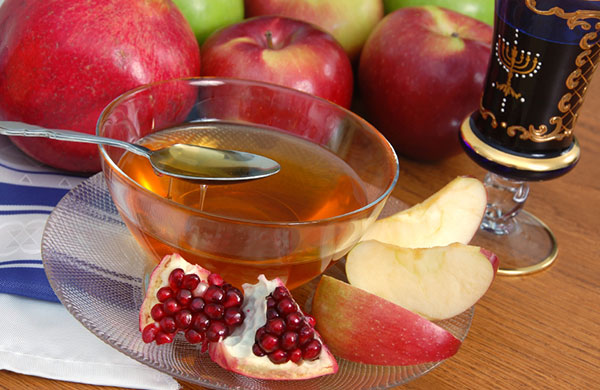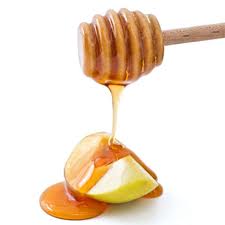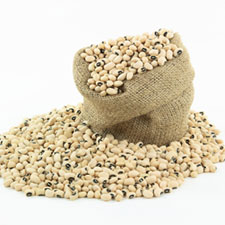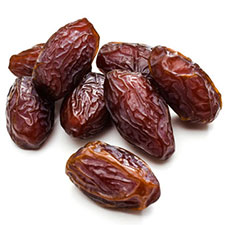
On Rosh Hashanah it is traditional to eat symbolic foods that either taste sweet or have names that sound similar to our hopes and prayers for the new year. On Rosh Hashanah, everything we do is imbued with extreme significance. The foods are not magical. Eating these foods is just a little reminder to G-d of our desire and hopes for a happy and blessed new year.
The foods are: apples dipped in honey, leek, black-eyed peas, dates, gourds, pomegranate, head or tongue of cow or fish head and swiss chard.
Circular challahs represent the unending cycle of life and the round bread looks like a royal crown, a reminder of the coronation of G-d as king.
These round challahs are customary on Rosh Hashanah and often raisins are added to sweeten the taste.

Apples Dipped in Honey
One of the primary reasons why we use an apple is because of its sweetness. Coupled with the added sweetness of the honey, it is symbolic of the ultra-sweet year we hope G‑d will grant us.
There are many other sweet fruits, like peaches and mangos. The apple was specifically chosen because it symbolizes the Garden of Eden, which according to the Midrash has the scent of an apple orchard.
Swiss Chard
The Arabic word silleq means to remove or throw out. Syrian Jews usually eat Swiss chard in hope that G-d will remove enemies from their midst.
Black-Eyed Peas
Sephardim eat black-eyed peas for good luck in the new year.
Head, Fish Head or Tongue
Rosh Hashanah literally means “head of the year” in Hebrew. For this reason in some communities it is traditional to eat the head of a fish, head of cow or tongue during the Rosh Hashanah holiday meal. Fish is also eaten because it is an ancient symbol of fertility and abundance, they never sleep and they swim in water. We hope the year will be one of plenty, just as fish are extremely fruitful. Just as fish never sleep, we hope to maintain a constant awareness of our mission in life and to remain cognizant of G-d’s expectations at all times.
Gourds
The Hebrew word for gourd is k’rah, which means proclaim, as in “May our merits be proclaimed before G-d.” K’rah also means “rip up” as in “May harsh decrees be torn up.”
Pomegranates
Pomegranates often serve as the “new fruit,” a fruit not yet eaten this season. There are two reasons why the pomegranate is used as the new fruit. The Land of Israel is praised for its pomegranates in the Bible and because pomegranates supposedly contain 613 seeds. Thus, we display the desire to fulfill G-d’s 613 mitzvot by eating the pomegranate.
Leeks
These vegetables are known as karsi, related to the word karet, to cut off or destroy. By eating leeks we are asking, “May it be your will Eternal G-d that our enemies will be cut off.”
Dates
Dates are known as tamri, meaning consume or finish. This food is similar to the leeks in that it is eaten with the intent that all enemies will end their wrath.







